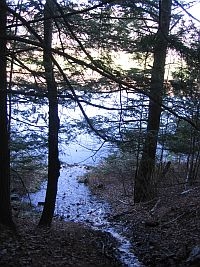 (Steve Zind) Ripley’s Believe It Or Not once called the six mineral springs of the Northeast Kingdom town of Brunswick the ‘8th Wonder of the World". The springs have long been known for their reputed healing powers.
(Steve Zind) Ripley’s Believe It Or Not once called the six mineral springs of the Northeast Kingdom town of Brunswick the ‘8th Wonder of the World". The springs have long been known for their reputed healing powers.
At one time a resort hotel stood next to the springs, catering to the well-heeled crowd that flocked there.
Today the springs are largely forgotten.
But if you visit them, you’ll see there are still signs of their colorful history, which is part blessing, part curse. It’s a story that dates back further than the written history of Vermont.
(April St. Francis Merrill Brunswick) My name is Chief April St. Francis Merrill of the Abenaki Nation of Missisquoi St. Francis Sokoki Band. We own the springs and it’s a parcel that’s been sacred to our people for thousands of years. We were always told that the waters there were medicine, and that they were used for healing and we were also told that there’s a curse on this land: If anybody tried to make a profit from these waters, things would happen."
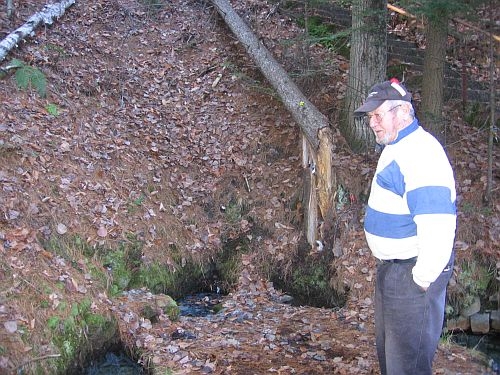
(Zind) Where the Abenakis saw sacred ground, someone else saw real estate. And here’s what did happen:
In the 19th century a resort hotel was built next to the springs. An advertisement from the period beckons summer tourists with descriptions of spacious guest suites, croquet on the lawn, the Boston paper delivered daily – and claims that the springs would cure all kinds of ailments. In the 1890s the hotel burned to the ground. Some say it was the Abenaki curse.
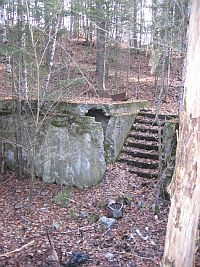 Another fire claimed a guest cottage built later near the springs.
Another fire claimed a guest cottage built later near the springs.
Then in 1930, a new hotel was built; a grand structure more than 100 feet long and four stories high. It burned down before the first guest could check in.
(Paul Savage) "Well, I’m Paul Savage. My father built the second hotel down there. And that burnt. And then he built a tea room down there."
(Zind) What Savage calls a ‘tea room’ was a bar. Apparently it didn’t trigger the curse – maybe because the patrons weren’t there for the spring water. They came for the liquor and dancing.
Savage lives about a mile from the springs, which aren’t easy for a non-local to find. The road to them is no longer open.
(Brunswick) "That back there used to be the road. The town doesn’t want anybody down in there. Lot of blow-downs and they just left them.
(Zind) "What’s this road?"
(Savage) "This is an old logging road."
(Zind) Savage lives in his parents’ house and sleeps in the room where he was born. For him, the woods we pass through are full of memories.
(Brunswick) "I found a guy hanging years ago, right over here. He was an old time logger. He got sick of living. Just tied a rope around a limb, sat down. And there he sat."
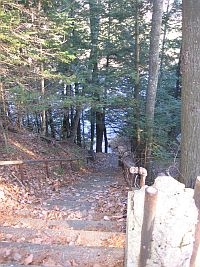 (Zind) The area around the springs is a pretty spot. There’s a quiet pond with a skim of ice. Little remains from the days when women with parasols strolled manicured lawns on this spot. Through the lifeless scrub and underbrush you can see what’s left of the foundation of the old hotel that Savage’s father built 80 years ago.
(Zind) The area around the springs is a pretty spot. There’s a quiet pond with a skim of ice. Little remains from the days when women with parasols strolled manicured lawns on this spot. Through the lifeless scrub and underbrush you can see what’s left of the foundation of the old hotel that Savage’s father built 80 years ago.
(Bunswick) "This had to be the main entrance, right here.
(Zind) Near the foundation, worn concrete steps lead steeply down to the Brunswick Springs.
The springs emerge from the ground, one next to the other and gather in a series of small pools.
(Brunswick) "One, two, three, four, five, six. See, sulfur is here and then iron was here.
(Zind) "We’re standing on a concrete platform that’s in front of the spring. Thinking back to when you were a boy, what did this look like?"
(Savage) "Oh, this was beautiful. This was beautiful."
(Zind) The late fall day is warm and dry. Savage is 81, but he gamely lowers himself until he’s lying flat on the ground, and I join him. With our faces at the water’s surface, we taste what once drew so many people to this place, hoping for a miracle cure for their illness, or the key to continued health.
(Zind) Oooh! This one definitely has the sulfur, rotten egg taste to it!
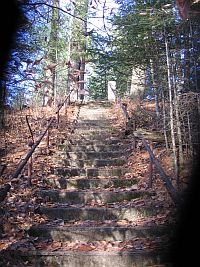 (Zind) The water in all the pools has a strong sulfur flavor that makes you wince.
(Zind) The water in all the pools has a strong sulfur flavor that makes you wince.
According to the lore, each spring is supposed to contain a different mineral: Sulfur, bromide, iron, calcium, arsenic and magnesium.
Savage says once upon a time, the water in each pool tasted different but now it’s mixed together.
Of course, there are skeptics who think the springs are all the same – and just water that seeps from that placid pond nearby.
But clearly there are people who come here in the belief that there is magic. They’ve left offerings all around the springs.
(Brunswick) "Look at this."
(Zind) "What are these little talismans?"
(Brunswick) "Indians come here to honor the springs. They’d come for medical purposes. What’s this here?"
(Zind) There are a handful of small smooth stones left in a depression above the springs, a fistful of dried grass knotted around a slender limb, and bracelets dangling from the bushes.
Once you started looking for them, it’s surprising how many of these offerings there are. It’s clear this spot still has significance to some people.
(Brunswick) "In fact the old hippie over here, he claims he can hear a woman singing."
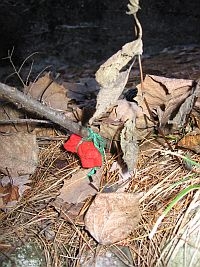 (Zind) The man Savage calls the old hippie is his next door neighbor and fishing buddy, Don Pelkey. When I visit with Pelkey later he explains that he’s part Native American. He says he first visited the springs with Savage a year ago.
(Zind) The man Savage calls the old hippie is his next door neighbor and fishing buddy, Don Pelkey. When I visit with Pelkey later he explains that he’s part Native American. He says he first visited the springs with Savage a year ago.
(Brunswick) "We were down there and we went fishing down on the backside and I had a weird feeling. Then I went down alone and I could hear this Indian maiden chanting. Then I went back down later and it was there again."
(Zind) Pelkey says he still hears the chanting when he visits the springs. He’s also one of the people who’ve left offerings there.
It seems no one makes a regular habit of drinking the water anymore.
At 91 years old Bill Boudle claims that the water from the springs cleared up a back problem and kept him healthy. He used to walk down to the springs once or twice a week all year to collect the water.
(Boudle) "Oh my God, I drank it for years. I used to have a jug, a gallon jug. When I was thirsty, I’d have a drink of water. It kept me going, seemed to."
(Zind) Some people say they’re sorry to see the area fall into disrepair, but that’s just he point according to Abenaki Chief April St. Francis Merrill. The Abenakis own the property now and St. Francis Merrill says they want the springs to gradually return to the way they appeared to Native Americans centuries ago.
Audio Postcards of Vermont Towns: View the entire series and nominate your town!